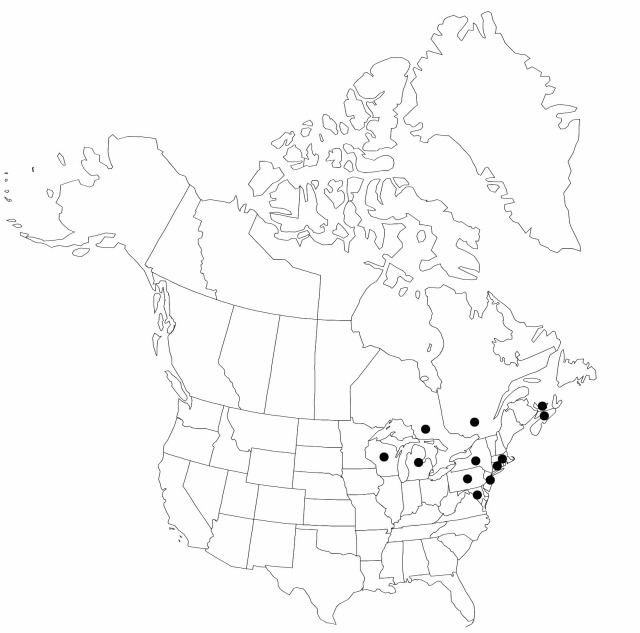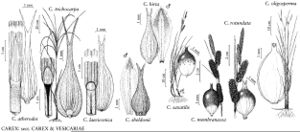Difference between revisions of "Carex hirta"
Sp. Pl. 2: 975. 1753.
FNA>Volume Importer |
imported>Volume Importer |
||
| (2 intermediate revisions by 2 users not shown) | |||
| Line 8: | Line 8: | ||
}} | }} | ||
|common_names=Carex hérissé | |common_names=Carex hérissé | ||
| + | |special_status={{Treatment/ID/Special_status | ||
| + | |code=I | ||
| + | |label=Introduced | ||
| + | }}{{Treatment/ID/Special_status | ||
| + | |code=F | ||
| + | |label=Illustrated | ||
| + | }} | ||
|basionyms= | |basionyms= | ||
|synonyms= | |synonyms= | ||
| Line 24: | Line 31: | ||
|elevation=0–600 m | |elevation=0–600 m | ||
|distribution=N.S.;Ont.;P.E.I.;Que.;Conn.;Maine;Md.;Mass.;Mich.;N.J.;N.Y.;Pa.;Wis.;Eurasia;introduced New Zealand. | |distribution=N.S.;Ont.;P.E.I.;Que.;Conn.;Maine;Md.;Mass.;Mich.;N.J.;N.Y.;Pa.;Wis.;Eurasia;introduced New Zealand. | ||
| + | |introduced=true | ||
|discussion=<p><i>Carex hirta</i> was first collected in North America in 1877 in Amherst, Massachusetts, and in 1878 in Philadelphia, Pennsylvania. Completely glabrous forms, known from Eurasia, have not yet been found in North America.</p> | |discussion=<p><i>Carex hirta</i> was first collected in North America in 1877 in Amherst, Massachusetts, and in 1878 in Philadelphia, Pennsylvania. Completely glabrous forms, known from Eurasia, have not yet been found in North America.</p> | ||
|tables= | |tables= | ||
| Line 47: | Line 55: | ||
|publication title=Sp. Pl. | |publication title=Sp. Pl. | ||
|publication year=1753 | |publication year=1753 | ||
| − | |special status= | + | |special status=Introduced;Illustrated |
| − | |source xml=https:// | + | |source xml=https://bitbucket.org/aafc-mbb/fna-data-curation/src/2e0870ddd59836b60bcf96646a41e87ea5a5943a/coarse_grained_fna_xml/V23/V23_932.xml |
|genus=Carex | |genus=Carex | ||
|section=Carex sect. Carex | |section=Carex sect. Carex | ||
Latest revision as of 20:44, 5 November 2020
Culms trigonous in cross section, (10–)20–90 cm. Leaves: basal sheaths brown, reddish purple tinged, inner bands slightly fibrillose with age; sheaths spreading pubescent; ligules 2–8(–10.5) mm; blades spreading, 2.5–8 mm wide, pubescent, not papillose abaxially. Inflorescences 8–50 cm; spikes erect or ascending; proximal (1–)2–3 spikes pistillate; terminal 1–3 spikes staminate. Pistillate scales ovate, apex acute to acuminate, scabrous-awned, sparsely spreading-pubescent or glabrous. Staminate scales ovate, apex obtuse to acuminate, shortly scabrous-awned except sometimes the proximal, sparsely to densely spreading-white-pubescent. Perigynia 12–20-veined, 4.8–7.8 × 1.7–2.5 mm, ± densely spreading-pubescent; beak 1.5–2.7 mm, spreading-pubescent, teeth spreading, 0.8–1.7 mm. 2n = 112–114.
Phenology: Fruiting Jun–Aug.
Habitat: Dry to wet fields, ditches, roadsides, railroad embankments, disturbed stream banks, lakeshores, and open forests
Elevation: 0–600 m
Distribution

Introduced; N.S., Ont., P.E.I., Que., Conn., Maine, Md., Mass., Mich., N.J., N.Y., Pa., Wis., Eurasia, introduced New Zealand.
Discussion
Carex hirta was first collected in North America in 1877 in Amherst, Massachusetts, and in 1878 in Philadelphia, Pennsylvania. Completely glabrous forms, known from Eurasia, have not yet been found in North America.
Selected References
None.
